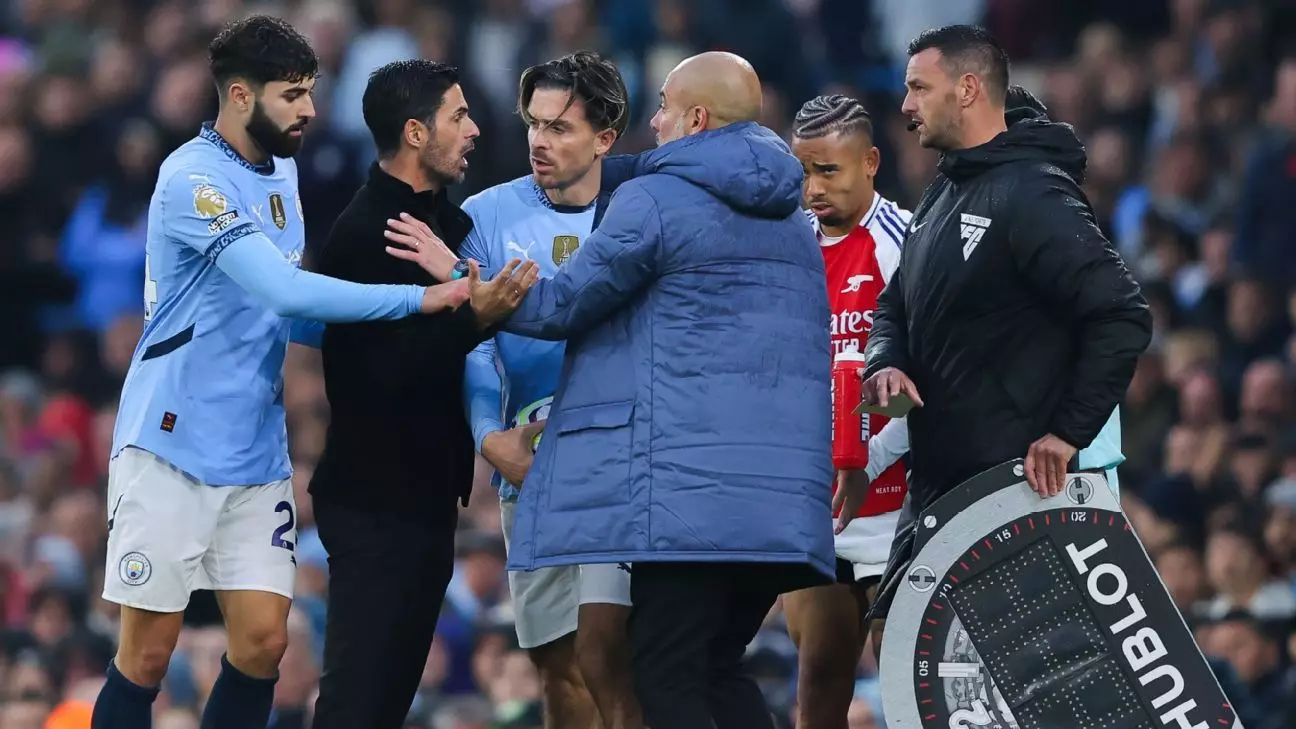The recent clash between Arsenal and Manchester City at the Etihad Stadium has ignited a heated debate in the football community. Manager Mikel Arteta found himself in the spotlight, defending his team against accusations of employing “dark arts” during the intense 2-2 draw. With key injuries shadowing Arsenal’s squad, the validity of these claims becomes even more complicated. Here, we delve into Arteta’s rebuttal, the criticisms from City players, and the broader implications for the Gunners moving forward.
In the aftermath of a dramatic match where Arsenal faced significant adversity, City players did not hold back in voicing their concerns. John Stones, Manuel Akanji, and Bernardo Silva specifically called out Arsenal’s tactics, emphasizing perceived time-wasting strategies utilized by the visiting team while attempting to protect a slender 2-1 lead, especially when reduced to ten men after Leandro Trossard’s red card. Stones stated that Arsenal has “done [dark arts] for a few years,” framing it as either clever gameplay or outright dishonesty. Such statements exemplify the emotional fallout from a closely contested match and highlight the pressure on players to put forth a narrative that frames their team in a favorable light.
Arteta, however, argued that the “dark arts” label is subjective. He elevated the conversation from simple accusations to the realm of facts and injuries that currently haunt his squad. His insistence on truth over conjecture captures the essence of a coach striving to maintain focus and composure amid controversy. The Gunners faced significant injuries after the match, with Martinelli, Timber, and Calafiori all exiting the game, and goalkeeper David Raya being seen with a bandaged knee. It is in this context that Arteta’s skepticism towards the criticisms of City’s players can be understood.
Mikel Arteta’s Defensive Strategy: A Tactical Overview
Arteta’s response was not just a dismissal of the criticisms; it was rooted in a broader tactical philosophy geared towards learning from past experiences. He referenced the Gunners’ nightmarish defeat against City in August 2021, which showcased the team’s vulnerabilities when playing with a man down. This reflection emphasizes Arteta’s proactive approach; the tactical decisions made during the game were influenced by previous failures and aimed at maximizing resources under challenging circumstances.
By adopting a well-defined strategy that included managing the game effectively when reduced to ten men, Arteta demonstrated a profound understanding of how to adapt to evolving match dynamics. While maintaining competitive integrity is vital, sometimes survival necessitates a re-evaluation of tactical norms; this inclination merits appreciation rather than condemnation.
Arteta also touched on the importance of sportsmanship in the final moments of the match. After Stones’ last-minute equalizer, City’s striker Erling Haaland advised Arteta to “stay humble.” The phrase underscores the intricate relationship between competition and dignity inherent in sports. Arteta’s response was measured, acknowledging that sport often results in emotional exchanges, but ultimately emphasizing a forward-looking mentality.
In a landscape often marked by hostility and rivalry, Arteta’s composure can serve as an example to teams navigating the pressure cooker of high-stakes football. His focus on building a cohesive unit that learns from experience and maintains respect for opponents is a reflection of a more mature and tactically astute manager.
As Arsenal gears up for upcoming fixtures, including the Carabao Cup tie against Bolton Wanderers, the narrative surrounding their performance and the characteristics of their play style will remain under scrutiny. Arteta’s insistence on transparency regarding player availability and injury concerns encourages a sense of realism amid the ongoing discourse.
The remarks from City players and Arteta’s measured responses illustrate the multifaceted nature of football rivalries—both the competitive spirit and the necessity for strategic thinking. Should Arsenal continue to weather the storm of criticism while building a resilient squad, they might just reshape the prevailing narrative and reinforce their status as genuine title contenders.

